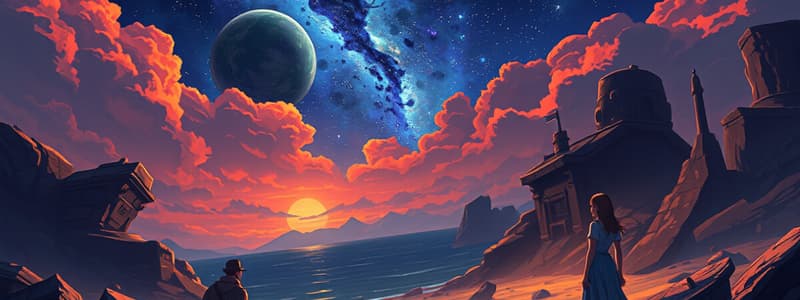Podcast
Questions and Answers
What are human made waterways called?
What are human made waterways called?
- Rivers
- Canals (correct)
- Lakes
- Streams
What is the ruler of a kingdom or empire called?
What is the ruler of a kingdom or empire called?
monarch
What term describes countryside areas?
What term describes countryside areas?
rural
What term describes city areas?
What term describes city areas?
What are long poems about one or more heroes called?
What are long poems about one or more heroes called?
What is a pyramid-shaped temple built by Sumerians called?
What is a pyramid-shaped temple built by Sumerians called?
What is the worship of many gods called?
What is the worship of many gods called?
What term describes the division of society by rank or class?
What term describes the division of society by rank or class?
Who is a legendary figure in Sumerian literature?
Who is a legendary figure in Sumerian literature?
What is the science of building called?
What is the science of building called?
What is the arrangement in which each worker specializes in a particular job or task?
What is the arrangement in which each worker specializes in a particular job or task?
What is the mixture of rich soil and tiny rocks which made land fertile for farming?
What is the mixture of rich soil and tiny rocks which made land fertile for farming?
Who performed religious ceremonies in ancient societies?
Who performed religious ceremonies in ancient societies?
Who were the writers of ancient Sumer?
Who were the writers of ancient Sumer?
What does it mean to have more than is needed?
What does it mean to have more than is needed?
What empire was built by Sargon?
What empire was built by Sargon?
What is the world's first writing system developed by the Sumerians?
What is the world's first writing system developed by the Sumerians?
What includes a city and all the countryside around it?
What includes a city and all the countryside around it?
What is a large arc of rich fertile land that stretched from the Persian Gulf to the Mediterranean Sea called?
What is a large arc of rich fertile land that stretched from the Persian Gulf to the Mediterranean Sea called?
What did the Phoenicians develop?
What did the Phoenicians develop?
What is the world's first collection of written laws called?
What is the world's first collection of written laws called?
What was the capital city of the Sumerians?
What was the capital city of the Sumerians?
What region lies between the Tigris and Euphrates Rivers?
What region lies between the Tigris and Euphrates Rivers?
What was a major invention of the Sumerians?
What was a major invention of the Sumerians?
What marked the beginning of civilization in the Fertile Crescent?
What marked the beginning of civilization in the Fertile Crescent?
Which writing system was invented by the Sumerians?
Which writing system was invented by the Sumerians?
What characterized Sumerian religion?
What characterized Sumerian religion?
What was the significance of Hammurabi's Code?
What was the significance of Hammurabi's Code?
Flashcards are hidden until you start studying
Study Notes
Vocabulary and Definitions
- Canals: Human-made waterways used for transportation and irrigation.
- Monarch: The ruler of a kingdom or empire.
- Rural: Pertaining to countryside areas, often characterized by farming and open spaces.
- Urban: Related to city areas, typically denoting dense population and infrastructure.
- Epic: Long poems that narrate the exploits of one or more heroes.
- Ziggurat: A pyramid-shaped temple constructed by the Sumerians for religious purposes.
- Polytheism: The belief in and worship of multiple gods.
- Social Hierarchy: A system that divides society by rank or class.
- Gilgamesh: A legendary figure from Sumerian literature, central to one of the oldest epics.
- Architecture: The science and art of building design and construction.
Economic and Agricultural Terms
- Division of Labor: An arrangement where workers specialize in specific tasks, enhancing efficiency.
- Silt: A rich mixture of soil and tiny rocks deposited by rivers, making land fertile for agriculture.
- Surplus: An excess of goods or resources beyond what is necessary for basic needs.
Historical Figures and Innovations
- Sargon: Established the world's first empire, creating a centralized authoritative system.
- Cuneiform: The earliest known writing system developed by Sumerians, utilizing clay tablets and styluses.
- City-State: A political unit that includes a city and its surrounding countryside.
- Fertile Crescent: A region extending from the Persian Gulf to the Mediterranean Sea, ideal for early agricultural civilizations.
Philological and Cultural Concepts
- Alphabet: Developed by the Phoenicians, marking significant advancements in written communication.
- Hammurabi's Code: The first extensive collection of written laws, set forth to ensure justice and societal order.
- Babylon: The capital city of the Sumerians, a hub of culture and commerce.
- Mesopotamia: The region situated between the Tigris and Euphrates Rivers, known as the cradle of civilization.
Major Ideas and Contributions of Sumerians
- Civilization Foundation: Mesopotamia's fertile valleys fostered initial civilization - food surpluses led to labor specialization and urban development.
- Importance of Writing: With the creation of cuneiform, Sumerians recorded history and facilitated trade, science, and communication.
- Achievements and Inventions: Notable contributions include the wheel, plow, medical records, architecture (ziggurats), and art forms like pottery and metalwork.
- Hammurabi's Code: Introduced comprehensive legal standards that enforced societal rules, contributing to governance and law in future societies.
- Religious Practices: Sumerians engaged in polytheism, with priests playing crucial roles in mediating between the gods and the populace; fulfilling religious duties was essential for societal order.
Studying That Suits You
Use AI to generate personalized quizzes and flashcards to suit your learning preferences.




